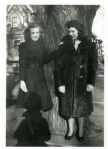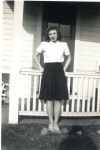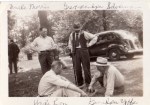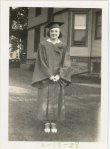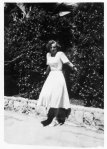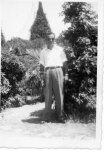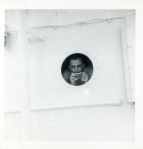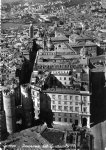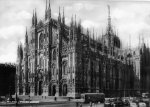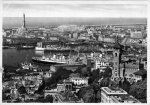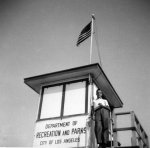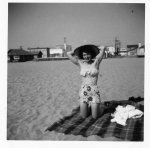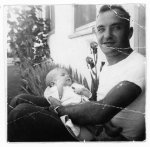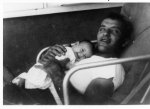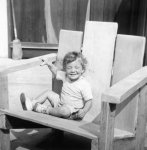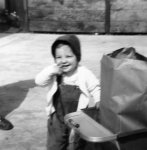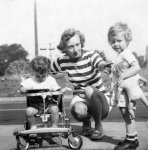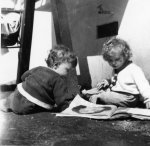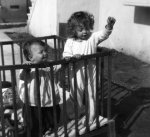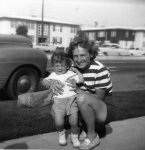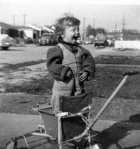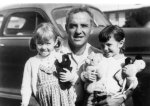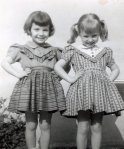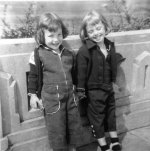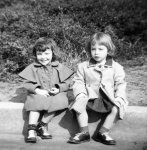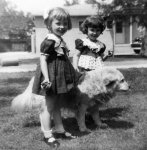by Elizabeth Stephens
“What is hateful to thee, do not unto thy fellow man. This is the whole law; the rest is mere commentary.”
Hillel the Great
“Do unto others as you would have them do unto you.”
Yeshua Ha’Moshiach

a Helen “Bebs” Yaffe as a young girl growing up in Madison, Wisconsin.
My mother Helen Yaffe grew up in Des Moines, Iowa, daughter of Minnie and Louis Yaffe. I knew very little of her early life except that her parents owned a grocery store that she and her sisters worked in after school. Helen, aka “Bebs” was the second of the four daughters. Her eldest sister was Doris, followed after her by Sharon and then Miriam, also known as “Mim” who was quite close to her sister “Bebs.”
Mim recalls, “For some reason I always felt especially close to Bebs. We never called her “Helen.” Helen was Aunt Helen, your Grandma Minnie’s sister. The story of where the name Bebs came from is that Doris was not yet two when Bebs was born and instead of saying “baby”, she said “Bebs.”
 Sharon and Doris both had dark hair, Bebs and I were blond. Maybe that made me feel close. Also there was a time when we could fit into each others clothes. Bebs and I often worked in our parent’s grocery store. We liked doing that. Doris and Sharon preferred doing things in the house.”
Sharon and Doris both had dark hair, Bebs and I were blond. Maybe that made me feel close. Also there was a time when we could fit into each others clothes. Bebs and I often worked in our parent’s grocery store. We liked doing that. Doris and Sharon preferred doing things in the house.”
 My Great Grandmother Libby Dora (Press) Silverman was married to Aaron Silverman. She was the youngest daughter of Benjamin and Chiah (Ida) Press who lived in Kovna, Lithuania in the 1890’s. They had five children (three sons and another daughter. I don’t know their names).
My Great Grandmother Libby Dora (Press) Silverman was married to Aaron Silverman. She was the youngest daughter of Benjamin and Chiah (Ida) Press who lived in Kovna, Lithuania in the 1890’s. They had five children (three sons and another daughter. I don’t know their names).
My Grandmother Minnie (Silverman) Yaffe was born in Des Moines, Iowa and was the oldest of seven children. She had four sisters, Mary, Helen, Lillian, and Belle; and two brothers Harry and Mose.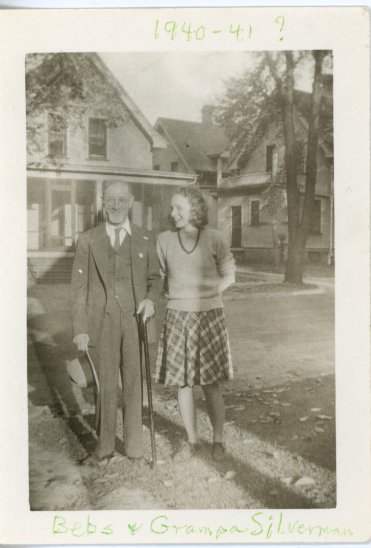
Minnie’s parents, Aaron and Libby Dora (Press) Silverman were from Des Moines, Iowa. They lived on 1136 Street. Here’s a photo of my Mother “Bebs” visiting “Grampa Silverman” around 1940 or 41.
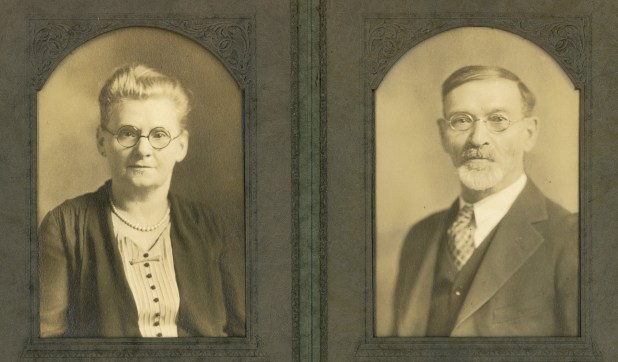
Grandmother Libby Dora Press Silverman and her husband Aaron Silverman. They lived in Des Moines Iowa.
One of their sons, Mose who was born on May 6, 1893 served as a lieutenant in Company B. One Hundred Sixty-eighth Infantry in WWI. In one of their newspaper clippings the headlines read, “SILVERMAN IS LUCKY.” Des Moines Officer Saved From Capture by Armistice. Lieut. Mos Silverman escaped capture by the Germans by the signing of the armistice, according to a letter received Friday by his parents Mr. and Mrs. A. Silverman, 1136 14th Street. He writes that while out searching for the assault battalion for whom he had armistice orders, he wandered behind the German lines and ran into three German officers. All that saved him was the arrival of the battalion, to whom he delivered the orders, which notified the combatants that the war was over.”
After the war there was a wedding announcement in the local newspaper which read, “Of interest to DesMoines friends is the marriage of Mr. Mose Silverman, son of Mr. and Mrs. A Silverman, 2401 High Street and Miss Rose Goldstein of Denver, Colo., which took place June 5 in Denver, where the groom is engaged in the advertising business. Mr. Silverman is a graduate of Drake University and was a member of Company B. One Hundred Sixty-eighth Infantry.”
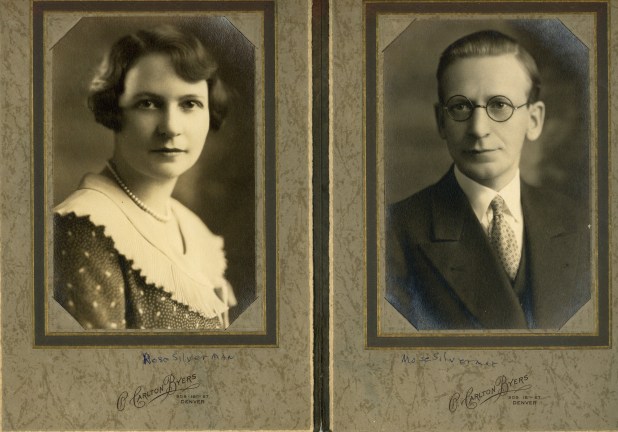
Rose Goldstein Silverman and Mose Silverman, my Aunt and Uncle during their early years in Denver, Colorado.
Dan Rottenberg, a genealogist in Finding Our Fathers, A Guidebook to Jewish Genealogy wrote,
- “As European Jews moved from country to country, they would continue to name children after ancestors but would alter those names to suit their new homelands.
- ‘Names would be modified by only using the first initial, e.g., Abraham becomes Arthur or Alan.
- Until the nineteenth century, whether or not to take on a family name was left to the individual Jew. Many family names were adopted from the town where the family came from.”
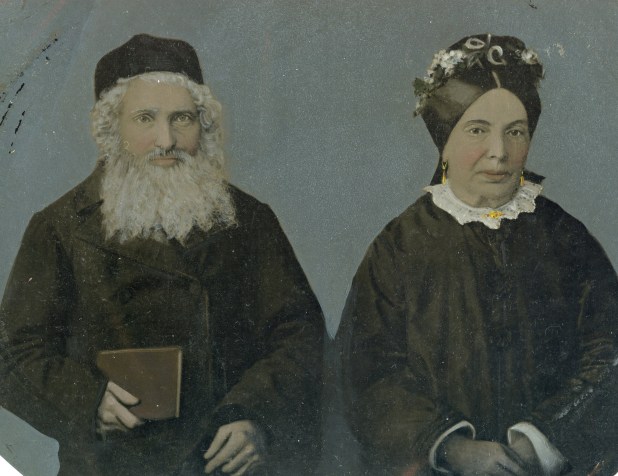
The Patriarch and Matriarch of the Silverman Family
“Emperor Joseph II of Austria, who issued the Edict of Toleration for the Jews in 1781, was the first to require Jews to take family names—in Galacia, in 1785. Jews were given names based on the size of the registration fee they could afford. The most expensive names derived from flowers and gems, like Rosenthal or Goldstein; for a smaller amount, you could get a name like Stahl (steel) or Eisen (iron); and if you had no money at all, you would be saddled with a nonsensical name…”

William Silverglatt, their daughter Sarah Elizabeth, and Miriasha (Schulman) Silverglatt
It may very well be that my Great, Great Grandfather William Silverglatt, may have had to purchase the right to use Silverglatt as his family name. Later he changed it to Silverman, which his three children, Aaron, Mendel, and Sarah Elizabeth were known by.
Rottenberg mentions that “In 1808 Napoleon required all the Jews of his empire to take family names, but his decree forbade Jews to take names based on localities or adopt names of famous families.”
On the other hand, in some parts of Europe, especially southern Germany, Jews were forced to change their names if they were of Biblical origin.
Under the Baden law of January 13, 1809, for example, Levites who customarily were named Levi were forced to choose new family names, most of which were derived from place names. Thus some Jews have had family names for less than 150 years.”
In attempting to figure out when the Presses, Silvermans, and Yaffes left Lithuania, Dan Rottenberg points to the historic migration of Jews during two periods.
- “By the laws of 1795 and 1835, the Russian government limited its new Jews to the newly annexed areas, since known as the Pale of Settlement” which included Kosvno, the district the Press family lived bounded by the Baltic Sea, Germany and Russia.
- To the south, was a town called Brody, located in the Austria-Hungary region. This was the “principal town from which in 1880 began the exodus of over 2 million Jews from the Pale to the United States, Britain, Europe, South America, and Palestine.”
- According to Rottenberg’s map notes, “In 1882, 500,000 Jews living in rural areas of the Pale were forced to leave their homes and live in towns or townlets (shetetls) in the Pale” [much like those in the film/play Fiddler on the Roof”]. 250,000 Jews living along the Western frontier of Russia were also moved into the Pale. 700,000 Jews living east of the Pale were driven into the Pale by 1891.“In 1882 more than 1.5 million Russian Jews who had managed to live outside the Pale were forced into it, so that by 1885 there were 4 million Jews living inside the Pale.”
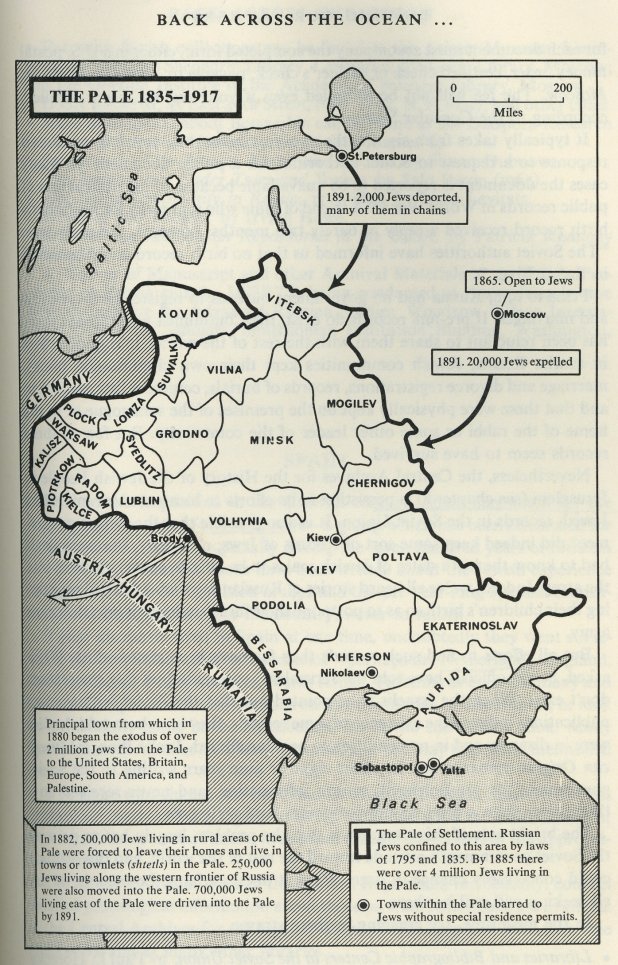
Finding Our Fathers, A Guidebook to Jewish Genealogy by Dan Rottenberg. Map of the Pale, page 119.
- “Prior to 1918, Russia had no government bureaus to register births, deaths, and marriages. If pre-1918 records do exist, the Communist government there has been reluctant to share them with the rest of the world. It is know that in czarist Russia, Jewish communities kept their own circumcision books, marriage and divorce registrations, records of burials, cemetery lists and so on…few of these records seems to have survived (Rottenberg:120).”
- “The greatest single source of Jews since the Middle Ages, by far, has been Poland. In 1939 the Jewish population of Poland was 3.25 million. The Jewish population of the Soviet Union was about 2.8 million—but virtually all Soviet Jews then (and now) lived in areas that had once been part of Poland. Thus on the eve of World War II, nearly 40 per cent of the world’s Jews lived in Poland itself or in formerly Polish territories, and at least another 20 percent were descendants of Polish Jews who had emigrated to America.
- “Medieval Jews lived in Poland and Lithuania because they were among the last countries to be Christianized. Poland was still a pagan country until the end of the tenth century, and Lithuania did not accept Christianity until about 1400. Pagan kings, having no religion of their own to promote, were much more tolerant of Jews than Christian kings, who believed their salvation depended on the elimination of heretics. While the land of Israel may be the ancestral homeland of the Jewish people, Poland is the more immediate ancestral homeland of most of today’s Jewish population.
“Jews have been in Lithuania since the eighth century, and in the eighteenth century their population numbered 250,000. For virtually all of the past six hundred years, Lithuania has been under the rule of some other country. It was once a grand duchy, but in 1385 it was united with Poland. When Poland was dismembered, the section that had been Lithuania came under the aegis of Russia in 1796. In 1918 Lithuania finally became an independent country, but this arrangement lasted only twenty-two years: Lithuania was overrun by the Nazis in 1940, was annexed by the Soviet Union in 1944 and is now a Soviet Socialist Republic.”
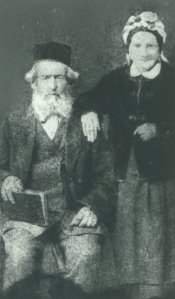
Benjamin and Chiah (Ida) Press. Taken in Kovna, Lithuania sometime before 1890. Notice the Torah in his right hand.
Great Grandmother Libby Dora Press’s parents were from Kovna, Lithuania. This photograph was taken sometime before 1890. Evidently, they had five children, three boys and two girls. The youngest was Libby who married Aaron Silverman.
I’m not sure exactly when Louis Yaffe came over but it may have been during the great migration out of Lithuania prior to World War I, since Grandmother Minnie’s brother Mose served as a US Lieutenant in 1918.
According to Mim, my Grandfather, Minnie’s husband, “Louis Yaffe was from Lithuania where he was apprenticed to a man who had orchards.”
Dan Rottenberg in his genealogical index, wrote that Yaffe is a variation of “Jaffe (also Jaffa, Jaffin, Jofe, Joffin, Ioffe)—Widespread rabbinic family whose branches in Italy, Russia, Austria, Germany, U.S.A., and Britain all descend from Mordecai Jaffe of Prague (1530-1612) and his uncle Moses Jaffe, who traced their ancestry to Samuel ben Elhanan, great-grandson of RASHI (1040-1105).* The name is Hebrew for “beautiful.”
Mim recalled, “I think he was around 19 or 20 when he came to the U.S. He had a cousin in Milwaukee who was married to a cousin of Minnie’s. That’s how Minnie and Louis met. When they married Grandpa Louis was a farmer and took Minnie—a city girl—to the farm. Doris and Bebs remembered living on the farm. I don’t know if Sharon remembers it. I don’t. I was probably only 2 or 3 when we moved into the city of Madison.”
“Bebs majored in math in college, Doris in humanities (she was Phi Beta Kappa!) Sharon majored in music. She’s amazing. She can play anything she hears.”
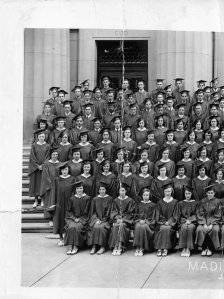
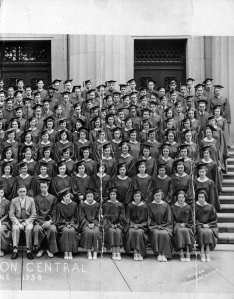
Your mother suffered from asthma all her short life. It was she who got us all to move to California. She first went to Colorado but the altitude was too much for her, so she went on to California. There she met your Grandma Minnie’s first cousins. She determined to stay in California, so soon after Aunt Lily and Belle and I with my grandfather Aaron Silverman drove from Madison, Wisconsin to Los Angeles.
Mim continued, “Bebs booked passage on a freighter after living in Los Angeles for some time. The freighter took her around the world and she got off at Haifa, Israel.
“Bebs” had saved her money to go on vacation to Hawaii, but the family told her she needed to spend her money in the homeland, Israel. As soon as Britain hauled down their Union Jack on May 14, 1948, Israel raised its flag featuring the Star of David. Israel’s engaged in a War for its Independence and she needed to support the cause. I am sure they wanted her to find a nice Jewish boy and settle down there.
The family seemed to have some means, so I was surprised that she was traveling alone during such perilous times. She must have been very brave.
From historic photos, I pieced together that my mother had traveled to many places before arriving in Israel. She had secured passage aboard a freighter bound to Tel Aviv.
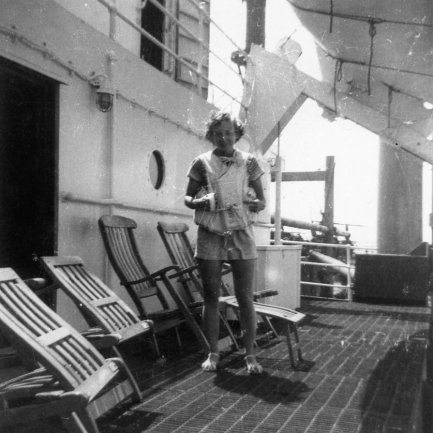
Bebs aboard the LaSalle.
-
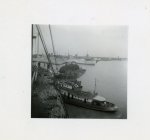
-
On June 30, 1949, Bebs left Mobile, Alabama. She took this photo from the LaSalle of which a part can be seen.
-
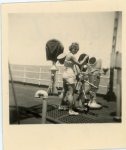
-
“Bebs” keep your eyes on the road! La Salle July 1949.
-

-
“Bebs” sunning herself aboard the LaSalle.
-
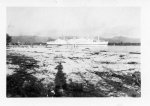
-
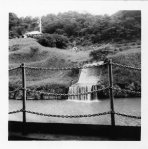
-

-

-
Gibraltar on July 15, 1949. “Gumboats” with scarves, cigarettes, cognac, etc. for sale to Americans. Bebs said she counted 21 of these boats on one side of the LaSalle.
-
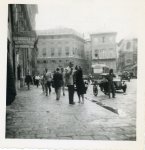
-
Getting directions in Genoa, July 1949.
-

-
“Bebs” in Israel July 1949.
-

-
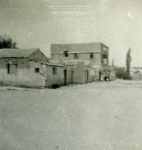
-

From Tel Aviv she wrote on August 4, 1949, “It’s pretty doggone hot in Tel Aviv, but tomorrow I’m going to Jerusalem where they tell me it’s cooler. Here I am definitely not making the most of my time because I really don’t have the energy to move. Attended the transcription of the Town meeting of the Air Sunday-you’ll hear it in the USA in about 3 weeks. Also saw La Boheme put on by the Hebrew National Opera. I enjoyed it. More another time. Love, Helen (“Bebs”).
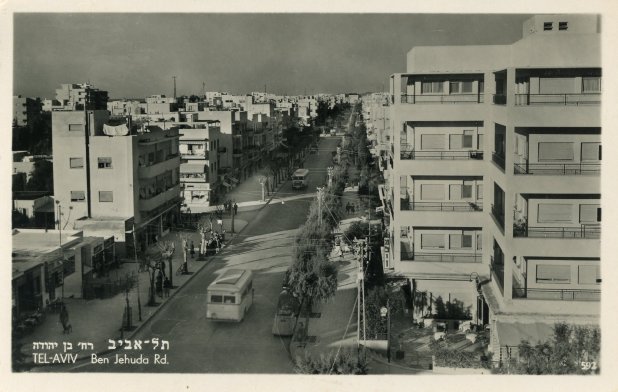
So far this is the story that I’ve pieced together of my brave and beautiful mother Bebs early years thanks to Mim and others. Although, I don’t remember her, my youngest daughter Taylor has said on many occasions, “Mom, she must have loved you very much.
*”No family can trace its ancestry back to Rashi in an unbroken line (Dan Rottenberg).
Regarding Rottenberg’s research on Rashi: “While it’s exciting to think about being related to Rashi, “consider the lineage I constructed after discovering in some old Hebrew books that the Marguilies branch of my family claimed to be descended from Rashi, the famous Talmudic commentator of eleventh-century France. Rashi is supposed to have been descended in the thirty-third generation from Johanan ha-Sandalar, who lived in second-century Egypt. Johanan was a great-grandson of Rabbi Gamaliel the Elder, who was in turn the grandson of Hillel the Great, the sage who lived in Jerusalem during the time of King Herod and Jesus” (Dan Rottenberg in Finding Our Fathers).
”
 Bebs http://and David celebrating on the Day of the Wedding in Israel.
Bebs http://and David celebrating on the Day of the Wedding in Israel. Elizabeth Lascar born in Los Angeles.
Elizabeth Lascar born in Los Angeles. A Young Buddhist Radical living in West LA.
A Young Buddhist Radical living in West LA. James and I at his 10 year reunion at James Monroe High School.
James and I at his 10 year reunion at James Monroe High School. James and I being baptized in the Pacific Ocean by Pastor Clarence in October 1984 in Santa Monica, California.
James and I being baptized in the Pacific Ocean by Pastor Clarence in October 1984 in Santa Monica, California.





















